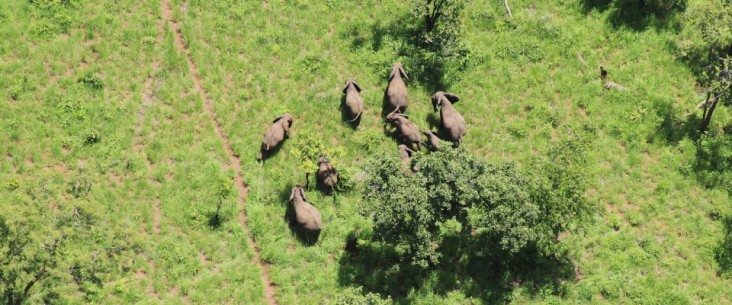- What We Do
- Agriculture and Food Security
- Democracy, Human Rights and Governance
- Economic Growth and Trade
- Education
- Environment and Global Climate Change
- Environmental and Natural Resource Management Framework
- Global Climate Change
- Conserving Biodiversity and Forests
- Sustainable Urbanization for Global Progress and Security
- Securing Land Tenure and Property Rights for Stability and Prosperity
- Sustainable Land Management
- Environmental Procedures Hub
- Knowledge Management for Environment and Natural Resources
- Tropical Forest and Coral Reef Conservation Act
- Environmental Policy Roadmap
- Gender Equality and Women's Empowerment
- Global Health
- Humanitarian Assistance
- Transformation at USAID
- Water and Sanitation
- Working in Crises and Conflict
- U.S. Global Development Lab
Speeches Shim

Consumer demand and transnational organized criminal networks are driving the illicit trade of wildlife and wildlife products. The illegal trade has evolved into one of the world's largest black markets and is valued at tens of billions of dollars. A broad development issue, wildlife crime threatens wildlife populations, wildlife-friendly livelihoods such as ecotourism, and community lands. The activities of criminal networks fuel global corruption and harm local communities and the ecosystems where they live. Criminals use people and wildlife for their own ends by pressuring people with few economic options into poaching, corrupting those that help transport illicit goods, and selling luxury items to consumers who may or may not understand the true cost of their consumption choices.
To address wildlife trafficking, the Agency works in priority countries that are sources of wildlife and wildlife products, transit points, and/or destinations for sellers and buyers. To support the enforcement of wildlife trade laws, USAID builds the capacities of rangers and scouts, forensic scientists, legislators, prosecutors, and judges to detect, arrest, investigate, prosecute, and adjudicate wildlife traffickers along this illegal supply chain. USAID also fosters the ability of community scouts to manage and protect wildlife as part of community-based conservation programs.
USAID’s comprehensive approach to addressing wildlife crime helps law enforcement staff and affected communities to reduce demand for wildlife products and interrupt the flow of illegal products. With this support, USAID’s partner countries can better fight the criminal networks that undermine development efforts, thereby better conserving their wildlife for future generations.
Our Work
The United States addresses illicit wildlife trade through the Eliminate, Neutralize, and Disrupt (END) Wildlife Trafficking Act of 2016 and the U.S. Presidential Executive Order on Enforcing Federal Laws with Respect to Transnational Criminal Organizations and Preventing International Trafficking 2017. The END Act directs federal agencies to work to strengthen law enforcement, reduce demand, and build international cooperation and commitment.
USAID and other U.S. Government agencies—including the Departments of State, Interior, Justice, and Commerce, among others—work together to reduce opportunities and incentives for wildlife poachers, traffickers, and sellers to engage in wildlife crime. In FY 2018, USAID invested more than $65 million to address wildlife trafficking through activities in more than 35 countries, including many END Act focus countries, such as Democratic Republic of Congo, Mozambique, and Vietnam.
Spotlight on Reducing Consumer Demand
Many USAID activities to combat wildlife trafficking aim to reduce demand for wildlife and wildlife products, including those focused on consumers in Southeast Asia and China.
In FY 2018, to raise awareness of China’s Wildlife Protection Law and reduce consumer demand for ivory, USAID leveraged $4.3 million from private-sector partnerships and screened campaign videos on 60,000 public screens, more than 1,500 flights, and more than 500 buses. The online video received more than 12 million views.
Because wildlife and wildlife products are sought for a variety of reasons—including food, medicine, art, apparel, and status—understanding consumer motivation is key to developing successful behavior change campaigns. USAID supported TRAFFIC, the wildlife trade monitoring network, in developing the “Wildlife Consumer Behavior Change Toolkit,” which is helping conservation professionals quickly access and apply information on the most effective practices and monitoring methods.
In 2019, USAID Wildlife Asia leveraged its understanding of ivory demand in Thailand to create the “Beautiful Without Ivory” campaign, featuring five celebrity influencers. Read more about the background research and outreach plans.
Spotlight on Justice
Once an animal is illegally taken or a suspected criminal is apprehended, an effective criminal justice system is needed to investigate and prosecute wildlife crime. USAID supports interagency collaboration, transboundary cooperation, and reforms to policies and practices to ensure wildlife crime is punished appropriately. USAID partners strengthened wildlife law enforcement in partner countries and trained hundreds of police, customs officials, prosecutors, and judges to bring wildlife criminals to justice. Strengthened by USAID investments, Malawi and Zambia seized more than 3.65 tons of ivory in FY 2018, resulting in 148 arrests. The USAID-supported Lilongwe Wildlife Trust also conducted two workshops for 89 prosecutors and magistrates on the new Wildlife Act and introduced a new custodial sentence monitoring program that increased the number of wildlife crime convictions and the length of prison sentences. As a result of these efforts, in the Malawi-Zambia Transboundary Landscape, elephant populations increased by 50 percent since 2016 and poaching is now nearly eradicated.

Comment
Make a general inquiry or suggest an improvement.